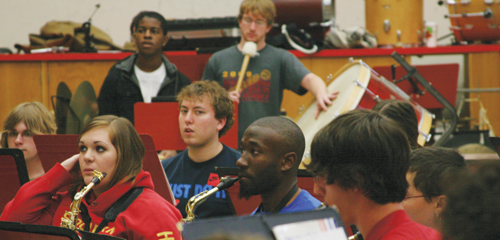
As musicians, we know that practice is critical to excellent performance. A good musician would never go into a performance without thoroughly preparing by studying and practicing. This concept holds true for most things in life, including teaching. The more we practice anything, the better we get at it.
Teacher preparation programs across the country include three basic elements – coursework, pre-intern observation, and an internship, also known as student teaching. There is considerable focus on coursework and the internship, but often the pre-intern observation receives less emphasis than it deserves. Pre-intern experiences can be the practice that makes all the difference. There is often too little teaching practice prior to a student’s internship and first job.
For a long time, the standard approach has been to require forty hours of observation in a classroom prior student teaching. However, there has often been little guidance about how to use this time. The experience can range from no instruction other than “find a school and observe” to a specific assignment at a school to observe a particular teacher, including instructions for what and how to observe. Depending on the teacher, the student might not get an opportunity to try teaching in this setting before student teaching.
Approximately 25 years ago, Richard O’Hearn, a former Director of the School of Music and Professor of Music Education at Western Michigan University, worked with the College of Education to implement a new approach to the pre-intern experience for music education students. As a result, our music school faculty oversees the 40 hours of observation for all music education students. This means that all of our students do their observation in music classrooms with our guidance.
O’Hearn reworked the curriculum so all music education methods classes meet from 8-10:50am on Tuesdays and Thursdays. This allowed these classes to cover academic work and travel to local schools for observation and initial teaching experiences. In all of our methods classes, students practice teaching with real students and get feedback to help them improve and nearly all of this happens during class time. O’Hearn recognized that feedback from a seasoned teacher required that students be observed and video-recorded while they taught.
He also implemented a wonderful activity to help prepare students for what they will face in the classroom. We lovingly call it Skunk Band. At the beginning of the fall semester, before taking students out into the local schools, we collect data from students in our Instrumental Methods I class (fall semester of the junior year), asking what instrument pedagogy classes they have taken and what teaching experiences they have had. Some have taught private lessons or band camps.
Then we assign each of them an instrument on which they have little or no experience (either flute, clarinet, alto saxophone, trumpet, trombone, or percussion), give them a method book, and form a beginning band. Each student is assigned a line in the method book and takes a turn teaching the group in a three- to five-minute period. They are responsible for making sure that students improve in their ability to play the line, but also perform the basics (posture, breath support, embouchure, and fingering) correctly.
In addition, to prepare them for classroom management, we distribute two to four notecards to students playing in the group that instruct them to act inappropriately in a specific way (e.g. asking a lot of questions or arguing with a neighbor) until they are appropriately corrected. Each student teaches the Skunk Band three times and after each time we discuss what happened as a class, they get individual feedback from a professor or a graduate assistant, and they watch and critique the video of their teaching. The students come away from this exercise with improved analytical skill, seeing both what went well and what they need to improve. By their third time up, the students are beginning to get comfortable with the dynamics of a real classroom.
To prepare for Skunk Band, we review basic instrument pedagogy and work on how to prepare for teaching a lesson. The preparation for teaching is really important. We begin with an exercise that asks students to write down a recipe for making the first sound on their instrument. They must give the recipe and their instrument to someone who does not play an instrument and ask them to try it with no feedback or reaction, only the paper. If it doesn’t work, then they must revise it and test it with new people until it does.
This reminds students how much we teach by example or demonstration while also helping them to sequence instruction appropriately. With these experiences, students improve their lesson planning as they move into the pre-intern phase. They have three semesters of practicum during Methods classes where they work with students, and we never allow students to teach unless they have a viable lesson plan that demonstrates an understanding of the situation, have an appropriate objective, and have put together logical steps to achieve and test that objective.
We work to balance preparation and practice so students are comfortable being in front of a group and teaching before they reach their student teaching. The internship should be similar to a masterclass in which a seasoned teacher assists and coaches a performer or teacher who is ready to perform on their own but can benefit from some time to hone their skills.
Over the years, I have sought out considerable feedback about our process from our graduates. One of the most common things that I hear was recently reiterated by David Hepinstall (2010 WMU Grad) who teaches at Plainwell High School in Plainwell, Michigan, “Skunk Band is real.” He also indicated that the situations were more concentrated in the Skunk Band experience than what he experienced in actual teaching. In the Skunk Band experience, there may be three or four classroom management issues in a five-minute lesson while Hepinstall may have only had one in a day.
On the other hand, Mark Stice (1998 WMU Grad) who teaches at Okemos High School in Michigan recalls thinking that “‘none of this will happen in a real teaching situation.’ I learned quickly that many incidents from during Skunk Band not only happened, but were tame compared to what I really encountered while teaching.” When asked what were the most important things that he learned from the Skunk Band experience, Stice said, “Expect the unexpected. Don’t overreact. Understand the point of view of the student [and] maintain control of yourself before managing the classroom.”
Jim VanEizenga (2011 WMU Grad), Director of Orchestras at Novi High School in Michigan stated, “Probably the single most important thing I learned in Skunk Band was simple classroom management – more playing, less talking. If the students are playing, they have less chance of doing things they shouldn’t be. I also learned how valuable proximity can be in effective classroom management and that sometimes it is more effective not to be on the podium. During Skunk Band I also learned to phrase instructions as clearly and concisely as possible, again so that I am talking less and the students are playing more.” In addition, VanEizenga noted, “My strongest memories of Practicum/Pre-internship Fieldwork stem from the experiences I had teaching elementary music and middle school band. Both of these experiences took me outside of my comfort zone of strings and into an area I was not good at (general music) and an area where as an instrumentalist I was comfortable, but unfamiliar. Both of these experiences really helped me to think through my lessons.”
It is interesting and rewarding that our current students see a connection between their Skunk Band experience and their pre-intern work even though they don’t have the benefit of career experience. Christopher Fosnot (currently a WMU senior) commented that “in the two semesters of pre-intern teaching I participated in during the Methods program, I witnessed a number of events similar to Skunk Band. From playing the clarinet while chewing gum to putting together a horn the wrong way, I noticed quite a few things that we had gone over in Skunk Band.” Stephanie Wilcox (currently a WMU senior) commented, “As a pre-intern I discovered Skunk band is real. Skunk band equipped me to be acutely aware of my students and to analyze how the students are responding. Because of this awareness I could respond quickly to situation practiced in the Skunk Band setting, in the real life classroom.” She also noted that “Skunk Band taught me to predict behaviors before they happen, and come up with a plan to handle them before they even happen. This made me confident as a teacher.”
When asked to describe the connection between Skunk Band and Practicum, Nick Voyt (currently a WMU senior) noted, “I think that Practicum was the most helpful out of the two [Skunk Band and Practicum], only because it gave me the chance to get in front of real kids and see how they reacted to me and my teaching. It was really good to get that constant feedback from them.” Wilcox added, “My strongest memory of practicum was being able to reflect on my teaching with my mentor teachers and professors, as well as reflecting on my videos. I was able to excel so much as a teacher with the instruction and constructive criticism I received.”
Joanna (Bozin) VanEizenga (2011 WMU Grad), who teaches K-5 Strings at Detroit Country Day School in Bloomfield Hills, Michigan indicated that “learning to write and implement lesson plans is one of the most essential skills learned in Practicum. When I taught at an elementary school in Kalamazoo, we had to submit all lesson plans for the week before school started each Monday. More importantly, the bulk of teaching is deciding what to teach and how to teach it every day. In Practicum, we were required not only to write out our lesson plans and multiple contingency plans for when things didn’t go as planned, but to have the sequence of each lesson internalized and memorized before interacting with students. While I do not write detailed lesson plans very often now, I do write short outlines and think through how I will teach each lesson and how I can respond flexibly to what might actually happen in my classroom.”
Bryan VanToll (2009 WMU Grad), Band Director at Three Rivers Middle School and High School in Three Rivers, Michigan said, “I learned that teachers are not as observant as we give ourselves credit for. While participating in Skunk Band, we were encouraged to misbehave. I learned quickly just how easily teachers can get wrapped up in our objective and our goal, and miss the big picture of what’s happening in your room. As a more experienced teacher, I now think of this as ‘taking the temperature of the room,’ where I will frequently stop my train of thought and simply observe the mood and feeling of the classroom. This really helps me to be more observant, as well as more relevant to where students are by connecting with how they’re feeling.”
Jim VanEizenga summed up the thoughts of numerous others by saying, “I think teaching, like most things in music, is best learned through doing. Being able to have even the shortest amount of time in front of students (or colleagues acting like students) was the most helpful. Being able to try different teaching techniques and figuring out what worked and what didn’t in a safe environment was so beneficial. When I got my teaching position, I already had a few skills that I knew would work while I was getting acclimated to new students.”
These are just a few of the reflections of students and grads that indicate the value of solid academic study coupled with real teaching experiences in preparation for teaching music. Our College of Education and Human Development at WMU often talks about “preparing reflective practitioners,” a concept I like. It requires us to consider what we are doing and not fall into a pattern of day-to-day teaching that is not examined with a critical eye for best practice and optimal outcomes. Preparation and assessment are as important as teaching. We must always work hard to build our skill and knowledge and then seek out as many experiences as we can to employ that knowledge and practice those skills, both as a student and as a professional life-long learner. That preparation and those opportunities can be found in any situation. Sometimes it is provided. Sometimes we make it happen for ourselves. As good musicians, we know what to do and the benefits of doing it. We simply need to transfer the process from musician to music teacher and the same amazing outcomes will occur.






